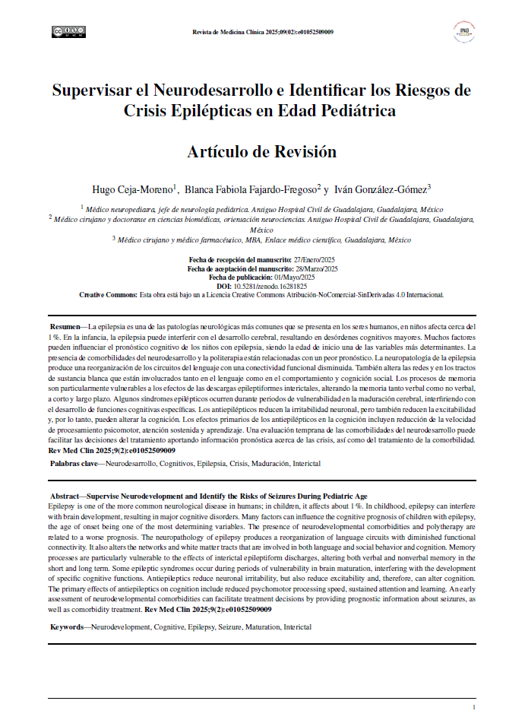Abstract
Epilepsy is one of the more common neurological disease in humans; in children, it affects about 1%. In childhood, epilepsy can interfere with brain development, resulting in major cognitive disorders. Many factors can influence the cognitive prognosis of children with epilepsy, the age of onset being one of the most determining variables. The presence of neurodevelopmental comorbidities and polytherapy are related to a worse prognosis. The neuropathology of epilepsy produces a reorganization of language circuits with diminished functional connectivity. It also alters the networks and white matter tracts that are involved in both language and social behavior and cognition. Memory processes are particularly vulnerable to the effects of interictal epileptiform discharges, altering both verbal and nonverbal memory in the short and long term. Some epileptic syndromes occur during periods of vulnerability in brain maturation, interfering with the development of specific cognitive functions. Antiepileptics reduce neuronal irritability, but also reduce excitability and, therefore, can alter cognition. The primary effects of antiepileptics on cognition include reduced psychomotor processing speed, sustained attention and learning. An early assessment of neurodevelopmental comorbidities can facilitate treatment decisions by providing prognostic information about seizures, as well as comorbidity treatment.
References
Jambaqué I, Pinabiaux C, Lassonde M. Cognitive disorders in pediatric epilepsy [Internet]. 1st ed. Vol. 111, Handbook of Clinical Neurology. Elsevier B.V.; 2013. 691-695 p. Available from: http://dx.doi.org/10.1016/B978-0-444-52891-9.00071-3
van Rijckevorsel K. Cognitive problems related to epilepsy syndromes, especially malignant epilepsies. Seizure. 2006;15(4):227–34.
Palac S, Kimford J. Antiepileptic Drugs and Neurodevelopment: An Update, Curr Neurol Neurosci Rep (2011) 11:423–427
Bromley RL, Leeman BA, Baker GA, Meador KJ. Cognitive and neurodevelopmental effects of antiepileptic drugs. Epilepsy Behav [Internet]. 2011;22(1):9–16. Available from: http://dx.doi.org/10.1016/j.yebeh.2011.04.009
Hum Brain Mapp. 2014 August ; 35(8): 3661–3672
Johnson, M. R. (2011). Heredity in epilepsy: Neurodevelopment, comorbidity, and the neurological trait. Epilepsy & Behavior.
Andell E, Tomson T, Carlsson S, Tedroff K, Åmark P. Neurodevelopmental comorbidities and seizure control 24 months after a first unprovoked seizure in children. Epilepsy Res. 2018;143(December 2017):33–40.
Bulteau C, Jambaque I, Viguier D, Kieffer V, Dellatolas G, Dulac O. Epileptic syndromes, cognitive assessment and school placement: A study of 251 children. Dev Med Child Neurol. 2000;42(5):319–27.
Gururaj A, Sztriha L, Hertecant J, Eapen V. Clinical predictors of intractable childhood epilepsy. J Psychosom Res. 2006;61(3):343–7.
Caplan R. Epilepsy, language, and social skills. Brain Lang [Internet]. 2017;(October 2015):0–1. Available from: http://dx.doi.org/10.1016/j.bandl.2017.08.007
Pal DK. Epilepsy and neurodevelopmental disorders of language. Curr Opin Neurol. 2011;24(2):126–31.
Gilby, K. L. (2013). Epilepsy, autism, and neurodevelopment: Kindling a shared vulnerability? Epilepsy & Behavior 26 (2013) 370–374
Tuchman R. What is the Relationship Between Autism Spectrum Disorders and Epilepsy? Semin Pediatr Neurol [Internet]. 2017;24(4):292–300. Available from: http://dx.doi.org/10.1016/j.spen.2017.10.004
Bourel-Ponchel E, (2019)Functional and Structural NetworkDisorganizations in Typical EpilepsyWith Centro-Temporal Spikes andImpact on CognitiveNeurodevelopment. Front. Neurol. 10:809
Carreño M, Donaire A, Sánchez-Carpintero R. Cognitive Disorders Associated with Epilepsy: Diagnosis and Treatment. Neurologist [Internet]. 2008;14(Suppl 1):S26–34. Available from: http://content.wkhealth.com/linkback/openurl?sid=WKPTLP :landingpage&an=00127893-200811001-00004
Braakman HMH, Vaessen MJ, Hofman PAM, Debeij-van Hall MHJA, Backes WH, Vles JSH, et al. Cognitive and behavioral complications of frontal lobe epilepsy in children: A review of the literature. Epilepsia [Internet]. 2011;52(5):849–56. Available from: http://doi.wiley.com/10.1111/j.1528-1167.2011.03057.x
Nickels KC, Zaccariello MJ, Hamiwka LD, Wirrell EC. Cognitive and neurodevelopmental comorbidities in paediatric epilepsy. Nat Rev Neurol [Internet]. 2016;12(8):465–76. Available from: http://dx.doi.org/10.1038/nrneurol.2016.98
Bourgeois BFD. Determining the Effects of Antiepileptic Drugs on Cognitive Function in Pediatric Patients With Epilepsy. J Child Neurol [Internet]. 2004;19(1S):S15–24. Available from: http://journals.sagepub.com/doi/10.1177/0883073804019001 03
Moavero R, Santarone ME, Galasso C, Curatolo P. Cognitive and behavioral effects of new antiepileptic drugs in pediatric epilepsy. Brain Dev [Internet]. 2017;39(6):464–9. Available from: http://dx.doi.org/10.1016/j.braindev.2017.01.006
Kim EH, Ko TS. Cognitive impairment in childhood onset epilepsy: Up-to-date information about its causes. Korean J Pediatr. 2016;59(4):155–64.
Hamiwka LD, Wirrell EC. Comorbidities in pediatric epilepsy: beyond "just'' treating the seizures. J Child Neurol. 2009;24(6):734–42.
Rudzinski LA, Kimford J. Epilepsy and Neuropsychological comorbidities, Continuum (Minneap Minn) 2013;19(3):682–696.

This work is licensed under a Creative Commons Attribution-NonCommercial-NoDerivatives 4.0 International License.
Copyright (c) 2025 Hugo Ceja-Moreno, Blanca Fabiola Fajardo-Fregoso, Iván González-Gómez

